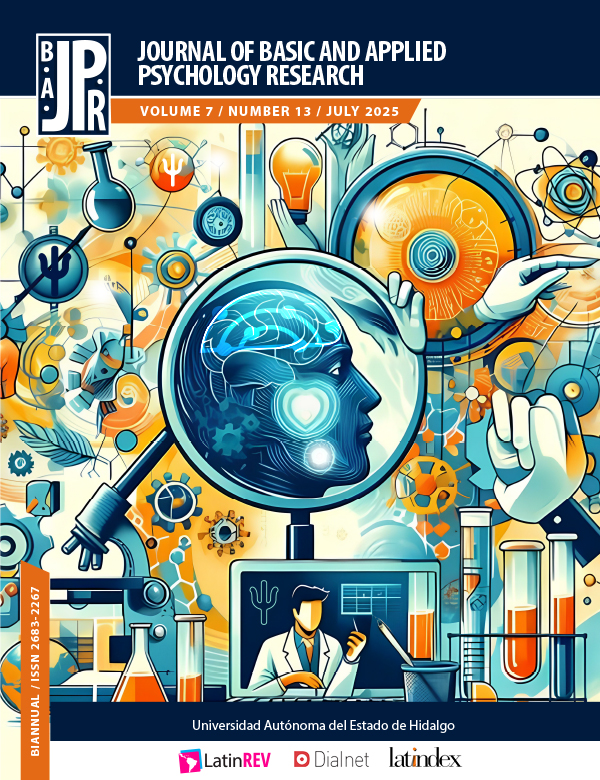Relationship between post-traumatic growth and gaudibility
DOI:
https://doi.org/10.29057/jbapr.v7i13.15063Keywords:
Potencially traumatic experience, Enjoyment, Post-traumatic growth, Psychological resourcesAbstract
Worldwide, it is estimated that 70% of the population will be exposed to a potentially traumatic event. Sometimes, after exposure to these events, post-traumatic growth occurs, which involves a profound psychological change in a positive sense. Gaudibility is a set of modulators that exists between the stimulus and the enjoyment, regulating the subjective sensations of living. The aim of the research was to study the relationship between post-traumatic growth and enjoyability in women from the state of Coahuila who had experienced at least one potentially traumatic event. The research design was quantitative, cross-sectional, descriptive, and correlational. The participants were adult women aged 18 to 68, residents of the state of Coahuila. The instruments used were the Post-Traumatic Growth Inventory and the Gaudibility Scale. The results showed that some participants had experienced more than one potentially traumatic event, with situations most commonly related to violence and the death of a relative. A moderate and positive correlation was found between the post-traumatic growth inventory and the gaudibility cale. Additionally, moderate and positive correlations were found between post-traumatic growth and the factors of interest and sense of humor, as well as a low and positive correlation with imagination. The study concluded that post-traumatic growth may increase some of the modulators of enjoyment, and that modulators such as interest, humor, and imagination could be part of post-traumatic growth.
Downloads
References
Altinsoy, F., y Aypay, A. (2023). ¿El tipo de exposición a eventos traumáticos influye en el crecimiento postraumático? Trauma psicológico: teoría, investigación, práctica y política, 15 (1), 27–36. https://doi.org/10.1037/tra0001173
Bellido-Bellé, A. Ma. (2016). Estrategias de afrontamiento y crecimiento postraumático en personas privadas de libertad [Universidad de Zaragoza (España)]. https://dialnet.unirioja.es/servlet/tesis?codigo=157784
Calhoun, L. G., y Tedeschi, R. G. (2006). Handbook of posttraumatic growth: Research and Practice. Lawrence Erlbaum Associates, Publishers. https://doi.org/10.1021/ja00905a033
Charlson, F., van Ommeren, M., Flaxman, A., Cornett, J., Whiteford, H., y Saxena, S. (2019). New WHO prevalence estimates of mental disorders in conflict settings: a systematic review and meta-analysis The Lancet, 394(10194), 240–248. https://doi.org/10.1016/S0140-6736(19)30934-1
Chun, S., y Lee, Y. (2008). The experience of posttraumatic growth for people with spinal cord injuryQualitative Health Research, 18(7), 877–890. https://doi.org/10.1177/1049732308318028
Fredrickson, B. L. (2001). The Role of Positive Emotions in Positive Psychology: The Broaden-and-Build Theory of Positive Emotions. Am Psychol, 56(3), 218–226. https://doi.org/10.1037//0003-066x.56.3.218
González-Cantero, J. O., González-Becerra, V. H., Ramírez-Zamora, L. M., Salazar-Estrada, J. G., del Rio, J. M., Sánchez, D. O., y Ramírez, A. A. V. (2018). Gaudiebility and Psychopathological Symptoms in the Mexican Population. Psychology, 09(05), 925–933. https://doi.org/10.4236/psych.2018.95057
Instituto Nacional de Estadística y Geografía (INEGI). (2021). Violencia contra las mujeres en México. https://www.inegi.org.mx/tablerosestadisticos/vcmm/#:~:text=En%202021%2C%20a%20nivel%20nacional,lo%20largo%20de%20su%20vida.
Kessler, RC, Aguilar-Gaxiola, S., Alonso, J., Benjet, C., Bromet, EJ, Cardoso, G., … Koenen, KC (2017). Trauma y TEPT en las encuestas mundiales de salud mental de la OMS. Revista Europea de Psicotraumatología, 8. https://doi.org/10.1080/20008198.2017.1353383
Koenen, KC, Ratanatharathorn, A., Ng, L., McLaughlin, KA, Bromet, EJ, Stein, DJ, … Kessler, RC (2017). Trastorno de estrés postraumático en las encuestas mundiales de salud mental.
Psychological Medicine, 47 (13), 2260–2274. https://doi.org/10.1017/S0033291717000708
Magallón-Gómez, M. T., Villegas-Castillo, S. M., Martínez-Medina, M. P., y Padrós-Blázquez, F. (2018). Gaudibilidad en varones con y sin trastorno antisocial de la personalidad. Acta Psiquiátrica y Psicológica de América Latina, 3(64), 168–175.https://www.researchgate.net/publication/328150327_Gaudibilidad_en_varones_con_y_sin_trastorno_antisocial_de_la_personalidad.
Marcovich, F. (2022). La imaginación y sus vínculos con la creatividad. Un análisis teórico desde la psicología del desarrollo. Revista de Psicología, 18(35), 84–98. https://doi.org/10.46553/RPSI.18.35.2022.p84-98
Organización Mundial de la Salud (OMS). (2024, May 27). Trastorno de estrés postraumático. https://www.who.int/es/news-room/fact-sheets/detail/post-traumatic-stress-disorder#:~:text=En torno al 70%25 de, atención de salud mental capacitados.
Padrós, F., y Fernández-Castro, J. (2008). Propuesta para medir un modulador de la experiencia de disfrute: la escala de gaudibilidad. Revista Internacional de Psicología y Terapia Psicológica , 8 (3), 413-430. https://www.redalyc.org/articulo.oa?id=56080313
Padrós-Blázquez, F., Martínez-Medina, M. P., Montoya- Pérez, K. S., y Montoya-Pérez, R. (2021). Propiedades psicométricas de la Escala de Gaudibilidad (Moduladores del Disfrute) para Adultos de Morelia (GSAM) PLoS ONE, 16 (7). https://doi.org/10.1371/journal.pone.0252543
Padrós-Blázquez, F., Herrera-Guzmán, I., y Gudayol-Ferré, E. (2012). Propiedades Psicométricas de la Escala de Gaudibilidad en una Población Mexicana. 12, 1–20.
Padrós-Blázquez, F., y Martínez-Medina, M. (2020). Gaudibilidad y consumo abusivo de alcohol en adolescentes. Psicosomática y Psiquiatría, 13–19.
Padrós-Blázquez, F., Martínez-Medina, M.,y Cruz- García, M. Á. (2011). Nivel de gaudibilidad en pacientes esquizofrénicos: un estudio piloto. Salud Mental, 525–529.
Padrós-Blázquez, F., Martínez-Medina, M. P., González Ramírez, V., Rodríguez-Maldonado, D., & Astals-Vizcaíno, M. (2011). Estudio del nivel de gaudibilidad en pacientes con diagnóstico de trastorno por dependencia de sustancias. Psiquis(México), 20, 64–69.
Pérez-Alvarado, D. (2023). Asociación entre el Sentido del Humor y la Salud Mental durante el Confinamiento por COVID-19 en México. Universidad Autónoma del Estado de Morelos. http://riaa.uaem.mx/handle/20.500.12055/3364
Quale, A. J., y Schanke, A. K. (2010). Resilience in the Face of Coping With a Severe Physical Injury: A Study of Trajectories of Adjustment in a Rehabilitation Setting. Rehabilitation Psychology, 55(1), 12–22. https://doi.org/10.1037/a0018415
Sierra-Murguía, M. (2021). Estilo de pensamiento, Crecimiento Post Traumático y biomarcadores inflamatorios/inmunológicos en pacientes con cáncer. Universidad Michoacana de San Nicolás Hidalgo. http://bibliotecavirtual.dgb.umich.mx:8083/xmlui/handle/DGB_UMICH/6285
Sierra-Murguía, M.A., Padrós-Blázquez, F., Mazatán-Orozco, R., Reynoso-González, O.U., & Fuentes-Balderrama, J. (en prensa). Propiedades psicométricas del Inventario de Crecimiento Postraumático en pacientes oncológicos mexicanos. Psicología Iberoamericana.
Tedeschi, R. G., y Calhoun, L. G. (1996). The Posttraumatic Growth Inventory: measuring the positive legacy of trauma. Journal of traumatic stress, 9(3), 455–471. https://doi.org/10.1007/BF02103658
Tedeschi, R. G.,y Calhoun, L. G. (2004). Posttraumatic Growth: Conceptual Foundations and Empirical Evidence. In Psychological Inquiry (Vol. 15, Issue 1, pp. 1–18). Routledge. https://doi.org/10.1207/s15327965pli1501_01
Valdés-García, K., Sánchez-Loyo, L., Padrós-Blázquez, F., Ambriz-Delgadillo, L., y Hermosillo-De la Torre, A. (2023). Gaudibilidad y depresión en estudiantes universitarios de Coahuila. Revista de Psicología de La Universidad Autónoma Del Estado de México, 12(31). https://doi.org/10.36677/rpsicologia.v12i31.21447
Downloads
Published
How to Cite
Issue
Section
License
Copyright (c) 2025 Karen Guadalupe Magallanes Diaz, Ferrán Padrós Blázquez, Iris Rubi Monroy Velasco, Marisol Franco-López

This work is licensed under a Creative Commons Attribution-NonCommercial-NoDerivatives 4.0 International License.















